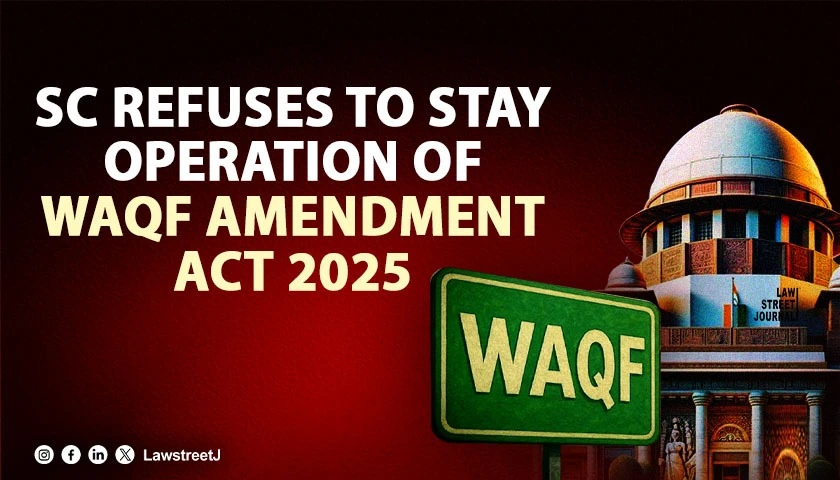NEW DELHI: The Supreme Court on Monday refused to stay the operation of the Waqf Amendment Act, 2025, but halted the implementation of the five-year-practicing Islam criteria for dedicating property for wakf.
A bench of Chief Justice of India B R Gavai and Justice Augustine George Masih said courts must assume validity of laws enacted by the Parliament and grant stay only in rarest of rare cases.
Pronouncing its order on interim prayers, the bench said, "We have considered prima facie challenge to each of the sections. We have found that no case was made out to stay entire provisions of statute. However some sections need some protection".
Among its directions, the court said the Collector cannot be permitted to adjudicate the rights of personal citizens and this will violate separation of powers.
"Till adjudication happens by the Waqf tribunal, no third party rights can be created against any parties. The provision dealing with such powers to collector shall remain stayed," the bench said.
On appointment of non Muslims to the tribunal, the bench said, though this court is not issuing any direction, it would be proper for the Centre not to nominate more than three non-Muslims into the 11-member Central Waqf Council.
Observing that there cant be more than three non muslim members in the waqf board and in total not more than four non muslim members, the court clarified that as far as possible the Chief Executive Officer of the Waqf Board should be a Muslim.
The court said so, while refusing to stay the amendment allowing the appointment of a non-Muslim as a CEO.
The court also said the determination of waqf by user by a government official would be subject to orders of jurisdictional HCs.
As far as Section 3(r) is concerned, this clause shall be stayed on showing person practicing islam for five years. Without any mechanism it will lead to excercise of arbitrary power, the court said.
Also Watch
The SC order finally stayed Sections 3(r), 2(c) proviso, 3(c) and 23 on the following grounds:-
- Section 3(r)- need 5 years as practising Islam stands failed until rules are formed, it would lead to arbitrary exercise of powers
- Section 2(c) proviso- waqf property shall not be treated as waqf property
- 3(c)- designed officer making challenge in revenue records permitting the collector to determine rights would be against separation of powers. Until finality, the rights of properties will not be affected. Until the title is not decided, neither waqf will be dispossesed of the property.
- Section 9 and 14 of Provision in the Amended Act that the Wakf council and Wakf board Shall not consist of more than 4 non-muslim members, and for State, not more than 3
- Section 23- Ex-officio officer must be from Muslim community as far as possible.
The court had on May 22 reserved its order on prayers for interim stay in a batch of petitions challenging the constitutional validity of the Act.
President Droupadi Murmu on April 5 gave her assent to the Waqf (Amendment) Bill, 2025, which was earlier passed by the Parliament after heated debates in both Houses -- Lok Sabha and Rajya Sabha.
Solicitor General Tushar Mehta had earlier submitted to the apex court that Waqf management had misused monuments, giving rooms for shops and making unauthorised alterations.
The Centre had earlier given an assurance that no waqf properties, including those established by user, would be denotified. It had also said that no appointment of non Muslims to the Central Waqf Council or State Waqf Boards would be made under the 2025 Act.
On April 25, the Union Ministry of Minority Affairs filed a preliminary affidavit defending the amended Waqf Act of 2025. The Centre had opposed any blanket stay by the court on a law having a presumption of constitutionality passed by Parliament.
The Supreme Court had said only five petitions will be treated as lead petition in the matter. The apex court said the other writ petitions will be treated as intervention applications. Over 100 petitions were filed against the 2025 Act.
Disclaimer: This content is produced and published by LawStreet Journal Media for informational purposes only and does not constitute legal advice. The views expressed are independent of any legal practice of the individuals involved.

















